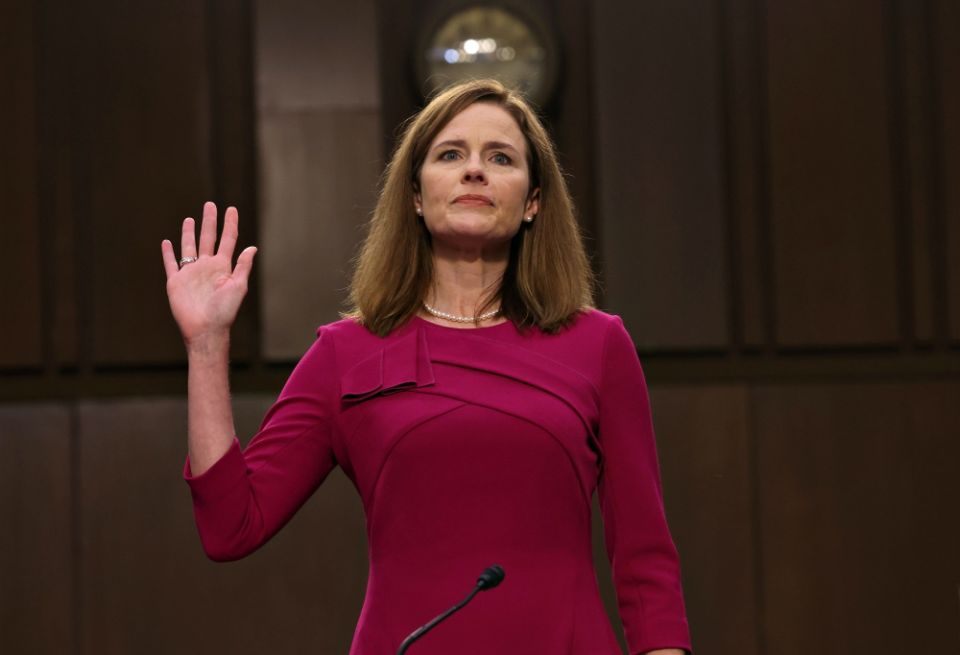
Amy Coney Barrett is scrutinized in confirmation hearings for her history of judicial opinions as well as the timing of these proceedings.
Last week the Senate Judiciary Committee held hearings for Judge Amy Coney Barrett. Barret is President Trump’s nomination to replace the Supreme Court seat previously held by the late Justice Ruth Bader Ginsberg after her death from metastatic pancreatic cancer on Sept. 18, 2020.
Barrett faced questions from the Senate Judiciary Committee, which is made up of 22 Senators—12 Republicans and 10 Democrats. Lindsey Graham (R-SC) is the chairman of the committee and Dianne Feinstein (D-CA) is the ranking minority party member. Other notable members include Sens. Ted Cruz (R-TX), Joni Ernst (IA), Chuck Grassley (R-IA), Amy Klobuchar (D-MN) and Kamala Harris (D-CA).
Presently there are eight justices on the Supreme Court. Ideologically, there are five conservative justices (Roberts, Thomas, Alito, Gorsuch and Kavanaugh) and three liberal justices (Sotomayor, Breyer and Kagan). Barrett is viewed as a conservative justice for her originalist and textualist approaches to interpreting the Constitution. Barrett who clerked for former Justice Antonin Scalia said she shares his philosophy of judicial interpretation. Barrett said that Scalia was her mentor and she agreed with many of his writings for the court’s majority or dissenting opinions.
“More than the style of his writing though, it was the content of Justice Scalia’s reasoning that shaped me,” Barrett said in her opening statement. “His judicial philosophy was straightforward: A judge must apply the law as written, not as the judge wishes it were. Sometimes that approach meant reaching results that he did not like. But as he put it in one of his best-known opinions, that is what it means to say we have a government of laws, not of men.”
“When I said that Justice Scalia’s philosophy is mine too, I certainly didn’t mean to say that every sentence that came out of Justice Scalia’s mouth or every sentence that he wrote was one that I would agree with,” Barrett said in response to a question from Sen. Feinstein. “When I said that Justice Scalia’s philosophy is mine too, what I meant was his jurisprudential approach to the text, as we’ve talked about originalism and textualism, is the same that I would take.”
Barrett faced many questions particularly from Senate Democrats about her views on issues including the Affordable Care Act, Roe v. Wade, climate change and Trump’s ability to pardon himself from crimes. Barrett refused to voice an opinion on many of these issues based on the canon of an impartial and unpolitical judicial body where judges are intended to refrain from sharing their opinions on political issues or issues that are still being adjudicated. This has been common for Supreme Court nominees in the past, but Barrett revealed less about her opinions on judicial decisions than did her predecessors.
“I think in an area where precedent continues to be pressed and litigated … it would be particularly – it would actually be wrong and a violation of the canons for me to do that as a sitting judge,” Barret said. “So if I express a view on a precedent, one way or another, if I say I love it or hate it, it signals to litigants that I might tilt one way or another in a pending case.”
Barrett reserved from sharing many of her political or judicial opinions. She affirmed many times that it is the responsibility of Congress and the legislative branch, rather than the courts and the judicial branch, to decide these issues of policy.
“Courts have a vital responsibility to enforce the rule of law, which is critical to a free society,” Barrett said. “But courts are not designed to solve every problem or right every wrong in our public life. The policy decisions and value judgments of government must be made by the political branches elected by and accountable to the people. The public should not expect courts to do so, and courts should not try.”
On Oct. 22, the Senate Judiciary Committee will vote on Barrett’s nomination and the full Senate is expected to have a floor vote next week. Republicans hold a 53-47 majority in the Senate over Democrats and only two Republican senators have voiced opposition to Barrett’s confirmation. With all Senate Democrats are expected to vote no on the confirmation, they will be looking to sway another two Republican senators so that they would have a simple majority to stop or delay Barrett’s confirmation.
